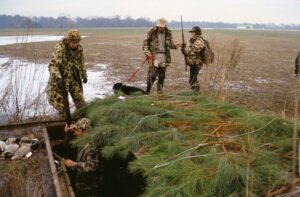As the seasons change, so do the regulations for hunters in Tennessee. With new rules and opportunities on the horizon, it’s essential for enthusiasts to stay informed and compliant. This article aims to provide a comprehensive guide to the latest in Tennessee hunting licenses, regulatory changes, seasonal information, wildlife management areas, and legal considerations to ensure a smooth and lawful hunting experience.
Key Takeaways
- Tennessee’s hunting and trapping regulations are undergoing changes for consistency and increased hunter opportunity.
- The spring turkey hunting season runs from April 13 to May 26, with success varying by region.
- New adaptive harvest management processes are influencing deer and turkey hunting regulations.
- Changes to Wildlife Management Areas, such as Cheatham Lake and Laurel Hill, include adjustments to hunting seasons and practices.
- Legal compliance, including transportation tags and check-in procedures, is crucial, with new requirements for commission membership.
Understanding Tennessee Hunting Licenses

Types of Hunting Licenses Available
Tennessee offers a variety of hunting licenses to meet the needs of both residents and non-residents. A hunting license in Tennessee is mandatory for anyone who wishes to hunt within the state’s borders. The Tennessee Wildlife Resources Agency (TWRA) provides several options, including the popular Tennessee lifetime hunting license, which allows for long-term access to hunting in the state without the need for annual renewals.
For those who are not residents but wish to enjoy the rich hunting grounds of Tennessee, the Tennessee nonresident hunting license is available. This includes the tn non resident fishing license for those who also want to fish. The twra fishing license is another option that combines the privileges of fishing with hunting rights. Here’s a quick breakdown of the types of licenses:
- Tennessee Lifetime Hunting License
- Annual Hunting License Tennessee
- Tennessee Nonresident Hunting License
- TWRA Fishing License
- Hunting and Fishing License in Tennessee
Purchasing a license is a straightforward process, and it can be done online, by mail, or in person at various locations throughout the state. It’s important to note that specific licenses like the lifetime hunting license Tennessee offers may require additional documentation to verify residency or other eligibility criteria.
Eligibility and Requirements for Hunters
In Tennessee, eligibility for hunting licenses varies depending on the type of license and the hunter’s residency status. Non resident Tennessee hunting license options are available for those who do not reside in the state, and the requirements differ from those for residents. For instance, a Tennessee non resident hunting license may come with different fees and regulations.
Senior citizens often have questions regarding their licensing needs. Specifically, many ask, “Do senior citizens need a fishing license in Tennessee?” The answer is that residents aged 65 and over can obtain a special license at a reduced cost, which includes the privilege to fish.
When it comes to special hunts, such as quota hunts, certain age restrictions apply. For example, applicants must be at least thirteen years of age to compete in the drawing for these hunts. Additionally, the Tennessee Wildlife Resources Agency provides opportunities for youth hunters, including a special youth permit for resident youth between 13 and 16 years old.
It is essential for all hunters to familiarize themselves with the specific eligibility criteria and requirements before applying for a license or permit to ensure compliance with Tennessee’s hunting regulations.
How to Purchase Your License
Purchasing a Tennessee hunting license is a straightforward process that can be completed in several ways. For those who prefer the convenience of the internet, a Tennessee fishing license online can be acquired through the official TWRA website. This platform also allows for a TWRA license lookup, ensuring that your information and license status are up to date.
For specific needs, such as a one-day fishing license tn or understanding how much is a senior fishing license in tennessee, the website provides detailed information and the ability to purchase various types of licenses. Below is a list of common license types and their respective fees:
- One-day fishing license TN: $11.50
- Annual fishing license (Resident): $34.00
- Senior fishing license (Resident, age 65 and over): $10.00
Remember, a valid email address is required during the purchase process as all confirmations and approvals will be sent electronically. If you encounter any issues or have questions, customer service representatives are available to assist you.
Regulatory Changes for the Upcoming Season

Adaptive Harvest Management Process
The Tennessee Wildlife Resources Agency (TWRA) has implemented an adaptive harvest management process to refine deer and turkey hunting regulations. This data-driven approach integrates harvest, biological, and population metrics to inform season structures and bag limits, aligning with management objectives.
The new process was applied in developing proposals for the 2024-2025 hunting seasons, including the creation of updated unit maps and hunting packages.
The adaptive framework is a shift from static regulations, allowing for more responsive management strategies. For instance, the proposal to remove the term “CWD” from management units reflects a move towards statewide consistency, while still maintaining disease control through specific CWD regulations.
Hunters are encouraged to utilize the “TWRA on the Go” app for efficient tagging and reporting of their harvests, embodying the agency’s commitment to simplifying regulations and enhancing the hunting experience.
Proposed Changes to Hunting and Trapping Regulations
The Tennessee Wildlife Resources Agency (TWRA) has put forward a series of proposed changes to the hunting and trapping regulations for the 2024-25 season. These proposals aim to enhance the hunting experience by simplifying rules, ensuring consistency, and expanding opportunities for hunters across the state.
In response to conservation concerns, the TWRA recommends removing the legal take of long-tailed weasels and spotted skunks, as these species have been listed as threatened and endangered in Tennessee. Meanwhile, no changes are suggested for migratory game bird seasons, with adjustments being made solely to align with the new calendar year.
The Agency’s approach to deer and turkey hunting regulations has been restructured using the adaptive harvest management process. This method incorporates harvest data, biological studies, and population metrics to determine the most effective season structures and bag limits.
Public input is crucial in finalizing these regulations. Hunters and interested parties are encouraged to submit their comments through the TWRA’s official channels by April 10. The Commission will review all feedback before voting on the proposals in their April meeting.
Public Comment Period and Finalization
The public comment period is a critical phase in the regulatory process for hunting and trapping seasons. It allows stakeholders and the general public to provide feedback on proposed changes. For the upcoming 2024-25 hunting season, the Tennessee Wildlife Resources Agency (TWRA) has opened the comment period through April 10. A detailed presentation of the season setting proposals is available on the TWRA YouTube page, and comments can be submitted through the designated online portal.
Following the closure of the comment period, comments will be thoroughly reviewed. This review is essential to ensure that the concerns and suggestions of the public are considered before finalizing the regulations. The proposals will then be put to a vote at the April Commission meeting. It’s important for interested parties to participate in this process to help shape the future of hunting and trapping in Tennessee.
The extension of the comment period to a total of 61 days demonstrates the agency’s commitment to a transparent and inclusive decision-making process.
Hunting Opportunities and Seasonal Information

Spring Turkey Hunting Season Dates
Tennessee’s spring turkey hunting season is a much-anticipated event for many outdoor enthusiasts. The 2024 season opens on April 13th and runs through May 26th, offering hunters the opportunity to engage in this traditional pursuit. The Tennessee Wildlife Resources Agency (TWRA) has set a statewide bag limit of one bearded turkey per day, with a season maximum of two. Notably, only one of the two can be a jake, ensuring the conservation of young male turkeys.
The success of hunters may vary depending on the region of the state they choose to hunt in. It’s important to plan accordingly and be aware of the specific regulations that apply to the area.
For young sportsmen, ages 6-16, a special weekend is designated on April 6-7, prior to the general season opening. This allows youth hunters to experience the excitement of turkey hunting and fosters a love for the sport at an early age. Last year’s spring harvest saw an increase, with over 31,800 birds taken, indicating a healthy and thriving turkey population in Tennessee.
Deer and Waterfowl Season Adjustments
The Tennessee Wildlife Resources Agency has made several proposals for the upcoming 2024-2025 hunting season, focusing on deer and waterfowl. Agency proposals for deer and turkey hunting were developed using the new adaptive harvest management process. This process incorporates harvest, biological, and population data to inform decisions on season packages and bag limits that align with management objectives.
For deer hunting, the Agency has proposed six distinct deer units with the statewide antlered bag limit remaining at two. The proposed season dates aim for uniformity, with the gun season for deer slated to start the Saturday before Thanksgiving, maintaining a long-standing tradition.
The waterfowl hunting season is also under review, with options for hunt splits being considered. However, no changes to migratory game bird season or bag limits are proposed, with adjustments being limited to date changes for the new season.
In terms of specific adjustments, the deer archery season in Laurel Hill WMA will be extended from two to eight weeks. Additionally, the bag limit for the Young Sportsman’s Hunt and Quota Antlerless Hunt will be increased to two deer, of which only one may be antlered.
Youth and Special Hunts
Tennessee offers unique opportunities for young hunters and those looking for special hunting experiences. The Youth Turkey Hunt is a prime example, allowing young sportsmen and sportswomen to take to the fields and forests before the regular season commences. This early season hunt not only fosters a love for the outdoors but also provides an excellent opportunity for youth to learn hunting ethics and skills in a less pressured environment.
For the upcoming season, the bag limit for the Young Sportsman’s Hunt has been increased, reflecting the state’s commitment to encouraging the next generation of hunters. Additionally, special hunts, such as quota hunts, are designed to manage wildlife populations effectively while offering hunters a chance at a more controlled and potentially rewarding hunting experience.
Hunting hours extend from 30 minutes before sunrise until sunset, with legal equipment including shotguns, bows, and crossbows. It’s essential for participants to be aware of the legal requirements and ensure they use the appropriate gear.
As regulations and opportunities evolve, it’s crucial for hunters to stay informed about the latest changes to make the most of their hunting season.
Navigating Wildlife Management Areas

Changes to Cheatham Lake and Laurel Hill WMAs
Significant changes are coming to the Cheatham Lake and Laurel Hill Wildlife Management Areas (WMAs) that will affect hunters in the upcoming season. The Cheatham Lake WMA will no longer have a turkey quota hunt, aligning it with the statewide turkey season. This change aims to simplify the hunting process for enthusiasts in the area.
At Laurel Hill WMA, several adjustments are being made to enhance the hunting experience. The waterfowl season will now match the statewide season, and regulations are being streamlined to permit dog training at night. Additionally, the deer archery season is being extended from two to eight weeks, providing more opportunities for archers. The Young Sportsman’s Hunt and Quota Antlerless Hunt will also see changes in bag limits.
These updates reflect a broader effort to harmonize local regulations with statewide seasons and to offer hunters more flexibility and time in the field.
For those keeping track of permit numbers, the Oak Ridge WMA will see a reduction in deer quota hunt permits. The number will decrease from 3,150 to 2,900 due to a combination of fewer huntable acres and a history of leftover permits.
Regulations for Dog Training and Trapping
In response to the need for clear guidelines, the Tennessee Wildlife Resources Agency (TWRA) has proposed clarifying language for wildlife management area regulations, particularly concerning dog training and trapping. All dogs not actively engaged in hunting or training must be leashed or otherwise restrained to ensure the safety and preservation of wildlife habitats.
The proposed changes aim to balance the interests of hunters, trappers, and the conservation of wildlife within these managed areas.
For those interested in the specifics of trapping regulations, the TWRA has suggested removing the legal take of long-tailed weasels and spotted skunks, aligning with their status on the State Threatened and Endangered Species list. This is part of a broader initiative to simplify and improve consistency of regulations across the state. Hunters and trappers can stay informed on the latest regulatory updates and participate in the public comment process through the TWRA website, where a twra login is required for access to detailed documents and comment submission forms.
Understanding Quota Hunts and Bag Limits
Understanding quota hunts and bag limits is crucial for hunters who wish to participate in managed hunts within Tennessee’s Wildlife Management Areas (WMAs). Quota hunts are designed to provide quality hunting experiences by limiting the number of hunters in a given area, which helps maintain healthy wildlife populations and habitat conditions. Each WMA may have specific quota hunts and bag limits that hunters must adhere to.
For example, the Laurel Hill deer archery season will be increased from two to eight weeks, offering more opportunities for hunters. Additionally, the bag limit for the Young Sportsman’s Hunt and Quota Antlerless Hunt will now allow for the taking of two deer, though only one may be antlered. Changes like these reflect the Tennessee Wildlife Resources Agency’s (TWRA) commitment to adaptive management based on wildlife research and population data.
Hunters should always check the latest regulations before participating in quota hunts, as these can change annually based on wildlife management objectives and hunter feedback.
The table below summarizes recent adjustments to quota hunts and bag limits for select WMAs:
| WMA Name | Hunt Type | Previous Permits | New Permits | Season Length Change |
|---|---|---|---|---|
| Laurel Hill | Deer Archery | N/A | N/A | Increased to 8 weeks |
| Oak Ridge | Deer Quota | 3,100 | 2,900 | Reduced due to acreage |
It’s important for hunters to be aware of these changes and plan their hunting season accordingly. The TWRA’s proposals and decisions are often based on scientific data and public input, ensuring that hunting remains a sustainable and enjoyable activity in Tennessee.
Legal Considerations and Compliance

Transportation Tags and Check-in Procedures
In Tennessee, properly tagging and checking in your game is a crucial step in the hunting process. After a successful hunt, you must immediately attach a temporary transportation tag before moving the game. This tag should include your name, license number, and the date and location of the harvest.
To complete the check-in, hunters can use their mobile device or go online. The Tennessee Wildlife Resources Agency provides a streamlined system for this purpose:
- Log in with your account details or sign up for a new account.
- Enter the required information, such as the date of birth and last four digits of your SSN.
- Follow the prompts to report your harvest.
It is essential to complete the check-in process within the prescribed time limits to avoid penalties.
For those without access to a phone, the bottom of your hunting license includes a temporary tag that can be used. Remember to complete your check-in online at the earliest convenience.
Commission Membership and Qualifications
The Tennessee Wildlife Resources Commission has undergone significant changes in its structure and appointment criteria. All commissioners are now required to have held a hunting and sport fishing license for a minimum of four years and must have been residents of Tennessee for at least five years. This ensures that those in charge of wildlife regulations have a vested interest and personal experience in the state’s outdoor activities.
The governor is mandated to select three gubernatorial appointees from nominee lists provided by organizations representing various outdoor enthusiasts.
Additionally, the commission’s membership has been streamlined from nine to seven gubernatorial appointees, effectively reducing the total number of members. Each commissioner is also permitted to designate a non-voting representative to attend on their behalf. It is important to note that any commissioner who fails to attend three consecutive meetings without valid reason will have their membership terminated.
The tenure of commission members has also been revised. While previously there were no restrictions on serving multiple terms, provided they were not consecutive, the new legislation prohibits any appointee from serving more than one term. This change aims to promote fresh perspectives within the commission.
Penalties for Non-Compliance
Adhering to hunting regulations is crucial for the conservation of wildlife and the safety of hunters and the public. Violations of Tennessee hunting laws can result in significant penalties, including fines, suspension of hunting privileges, and even criminal charges. It’s important for hunters to understand the consequences of non-compliance to avoid legal complications.
Hunters should be particularly mindful of the “Hunter Protection Act,” which classifies interference with lawful hunting as a Class C misdemeanor. This act underscores the seriousness with which Tennessee regards the right to hunt and the protection of hunters’ legal activities.
The following list outlines some common violations and their respective penalties:
- Hunting without a valid license
- Taking wildlife outside of the designated season
- Using prohibited methods or equipment
- Trespassing on private property without permission
- Failing to check in harvested game as required
Each of these infractions carries its own set of repercussions, ranging from monetary fines to revocation of hunting licenses. Hunters are encouraged to review the full spectrum of regulations to ensure full compliance with state laws.
Navigating the complexities of legal considerations and compliance in hunting can be daunting. Our website offers a comprehensive guide to General Laws and Regulations, ensuring you stay informed and hunt responsibly. From hunting licenses to seasonal restrictions, we provide up-to-date information to help you adhere to conservation laws and ethical practices. Don’t let legal uncertainties hinder your outdoor adventures. Visit our website now for authoritative guidance and peace of mind.
Conclusion
As Tennessee adapts its hunting regulations to ensure consistency and increased opportunities for hunters, it’s crucial for enthusiasts to stay informed about the changes for the 2024-25 seasons. The Tennessee Wildlife Resources Agency (TWRA) is committed to simplifying the process, as seen in the proposed adjustments to turkey and deer hunting regulations. Whether you’re a seasoned hunter or new to the sport, understanding and adhering to the updated rules is essential for a successful and legal hunting experience. Remember to check the 2023-24 Tennessee Hunting & Trapping Guide, visit www.tnwildlife.org, or use GoOutdoorsTennessee.com for the latest information and to purchase the appropriate licenses. With the spring turkey season underway and other changes on the horizon, it’s an exciting time for Tennessee hunters to enjoy the great outdoors while contributing to the state’s wildlife conservation efforts.
Frequently Asked Questions
What types of hunting licenses are available in Tennessee?
Tennessee offers various hunting licenses, including the hunt/fish combo, supplemental archery, sportsman license, and specific permits for turkey and deer firearms. The availability may vary based on season and game.
How can I purchase a hunting license in Tennessee?
You can purchase a Tennessee hunting license online at GoOutdoorsTennessee.com, at TWRA offices, or through licensed agents across the state.
What are the new regulatory changes for the upcoming hunting season in Tennessee?
The Tennessee Wildlife Resources Agency (TWRA) has proposed changes to simplify regulations, improve consistency across the state, and provide increased opportunities for hunters. Specific changes include adjustments to the Cheatham Lake and Laurel Hill WMAs, and a new adaptive harvest management process for deer and turkey hunting.
When does the spring turkey hunting season start and end?
The spring turkey hunting season in Tennessee starts on April 13 and continues through May 26.
What should I do if I harvest game but don’t have a phone to check in the animal?
If you don’t have a phone, use the temporary transportation tags provided with your license to check in your harvest online at GoOutdoorsTennessee.com or at a manned check station by midnight on the same day of the harvest.
What qualifications are required for the Tennessee Fish and Wildlife Commission membership?
Commission members must have had a hunting and sport fishing license for at least four years, been a resident of Tennessee for at least five years, and meet additional requirements set by the governor.





